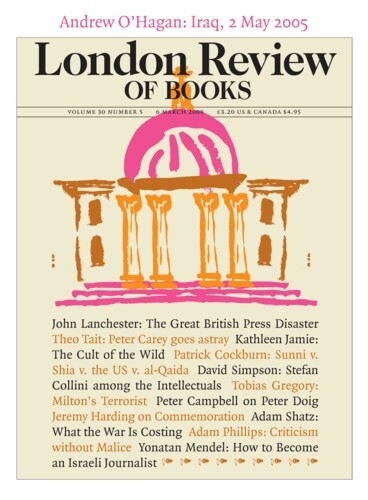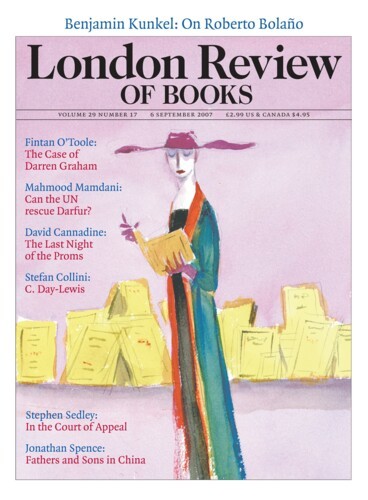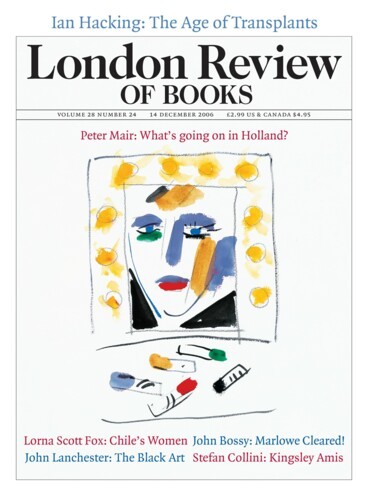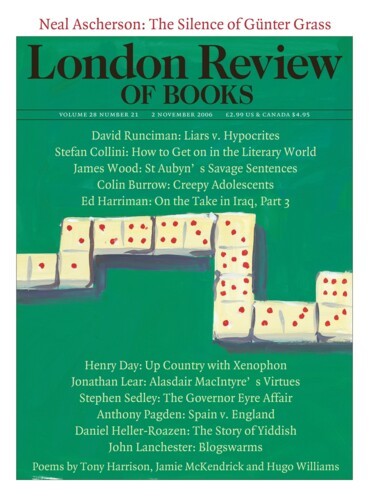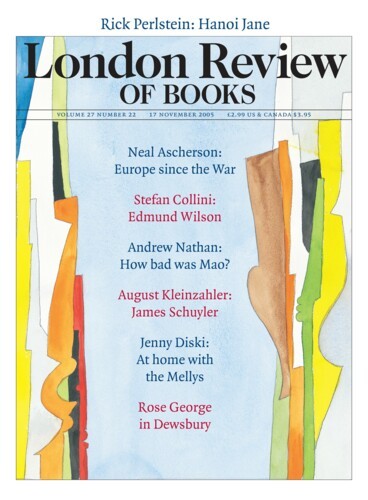Stefan Collini
Stefan Collini is the author of Absent Minds: Intellectuals in Britain, What Are Universities For? and The Nostalgic Imagination: History in English Criticism. His edition of Orwell’s Selected Essays was published in 2021. He is an emeritus professor of intellectual history and English literature at Cambridge.
Hierophants: C. Day-Lewis
Stefan Collini, 6 September 2007
What are poets good for? Are all attempts to speak of ‘the function of poetry’, with that reductive definite article, doomed to pompous failure? In response to these questions, the sentence which precedes Shelley’s over-quoted dictum that ‘poets are the unacknowledged legislators of the world’ is rarely cited, and one can see why. ‘Poets,’ he writes,...
Do you think he didn’t know? Kingsley Amis
Stefan Collini, 14 December 2006
Giving offence has become an unfashionable sport, but Kingsley Amis belongs in its hall of fame, one of the all-time greats. When Roger Micheldene, the central character in his 1963 novel, One Fat Englishman, is warned that he’s about to say something he’ll be sorry for, he replies, ‘those are the only things I really enjoy saying’ – and there isn’t much...
Boomster and the Quack: How to Get on in the Literary World
Stefan Collini, 2 November 2006
In the early 20th century, literary pilgrims to Stratford-upon-Avon already knew a lot about the great writer they had come to honour. The author’s house in Church St has rather come down in the world since then and is now an outpost of Birmingham University, but in its heyday it was home to a writer with some claims to be the most widely read, in English and in translation, across the...
Liquored-Up: Edmund Wilson
Stefan Collini, 17 November 2005
Edmund Wilson has become an object of fantasy. A lot of desire is currently invested in him as the representative of a cherished role: the critic-as-generalist, the man of letters as cultural critic, or what in the last decade or more it has become common in the United States to call the ‘public intellectual’. Fantasies are, by definition, about the not-present, and all of these...
Podcasts & Videos
Anthony Wilks's film traces the connections between the events of Eric Hobsbawm’s life and the history he told, from his teenage years in Germany and his communist membership, to the jazz clubs of 1950s...
Early and Late Kermode
Stefan Collini, Mary-Kay Wilmers, Thomas Jones and Andrew O’Hagan
Stefan Collini talks to Thomas Jones about the life and work of Frank Kermode, and Mary-Kay Wilmers remembers him as a contributor to the LRB.
Pieces about Stefan Collini in the LRB
Lumps of Cram: University English
Colin Kidd, 14 August 2025
What is the missing noun to which English refers: literature, language or both? If both, does English belong with the study of other modern languages and literatures? Is its primary concern with literature...
The Terrifying Vrooom: Empsonising
Colin Burrow, 15 July 2021
Reading an Empson essay is like being taken for a drive by an eccentric uncle in a terrifyingly powerful old banger. There are disturbing stains on the upholstery and an alarming whiff of whisky in the...
Is It Glamorous? Stefan Collini among the Intellectuals
David Simpson, 6 March 2008
George Orwell is commonly invoked as the ideal role model for the intellectual: feisty, independent, outspoken and contrarian, active in the public sphere, and famous. So it’s a surprise to...
Athenian View
Michael Brock, 12 March 1992
In seven of the nine chapters in this fine book Dr Collini depicts the denizens of the Athenaeum in its great days. T.H. Huxley, having left his umbrella at Matthew Arnold’s, asks his...
Burrinchini’s Spectre
Peter Clarke, 19 January 1984
Time was when Clio had a seamless garment: but that was before the division of labour set in. Prefixless history is now condescendingly thought of as ‘straight’ history and her...
Read anywhere with the London Review of Books app, available now from the App Store for Apple devices, Google Play for Android devices and Amazon for your Kindle Fire.
Sign up to our newsletter
For highlights from the latest issue, our archive and the blog, as well as news, events and exclusive promotions.
